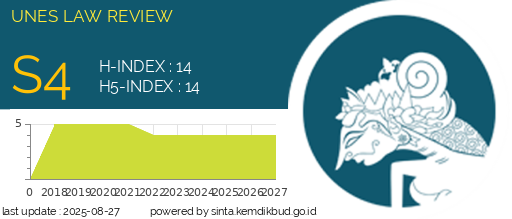FORMULASI KEBIJAKAN SEKTOR PARIWISATA: PEMBERDAYAAN DAN PENINGKATAN PEREKONOMIAN PELAKU USAHA
DOI:
https://doi.org/10.31933/unesrev.v5i4.672Keywords:
Reformulation, Tourism, Empowerment, Businessmen, North TorajaAbstract
One of the authorities of the Regional Government is the field of tourism, this delegation of authority is emphasized in several laws and regulations. However, North Toraja Regency, which has tourism potential, does not yet have derivative regulations to empower and improve the economy of business actors. This article focuses on disclosing the basis for the formation of local regulations on the implementation of tourism and content specifically related to business actors. The method used is normative-empirical, focusing on examining primary data through open interviews, and examining secondary data, analyzed qualitatively. Referring to several laws and regulations, it is regulated that the local government has the authority and even emphasized several obligations to take care of tourism affairs, so that the North Toraja Regency government is seen as important to form regional regulations, while the content material related to business actors is realized by setting the norms of obligation for the government to conduct training for business actors, where the material is prepared on the basis of research so that business actors in the tourism and culinary management sector are able to increase the number of tourists, the income of business actors, as well as regional original income, the article contains standardization of the construction of identical infrastructure for each regions, and facilitating special partnerships with the need for appropriate technology for business actors, as well as facilitating access to capital with banks and investors.
Downloads
References
Aliansyah, H., & Hermawan, W. (2019). Peran sektor pariwisata pada pertumbuhan ekonomi Kabupaten/Kota di Jawa Barat. Bina Ekonomi, 23(1), 39-55.
Attamimi, H. (2017). Materi Muatan Peraturan Perundang-undangan. Jurnal Hukum & Pembangunan, 15, 54-65.
Baltescu, C. A. (2016). Culinary experiences as a key tourism attraction. Case Study: Brasov County. Bulletin of the Transilvania University of Brasov. Series V: Economic Sciences, 107-112.
Björk, P., & Kauppinen-Räisänen, H. (2014). Culinary-gastronomic tourism–a search for local food experiences. Nutrition & Food Science, 44(4), 294-309.
Data Indonesia.id, Pendapatan Devisa Pariwisata Indonesia Melejit pada 2022, https://dataindonesia.id/sektor-riil/detail/pendapatan-devisa-pariwisata-indonesia-melejit-pada-2022 Diakses 22 Mei 2023.
Gasong, D. (2018, July). Analisis pendapatan masyarakat di lokasi wisata Ke’te’Kesu’Kabupaten Toraja Utara. In Prosiding Seminar Nasional Sinergitas Multidisiplin Ilmu Pengetahuan dan Teknologi (Vol. 1, pp. 164-171).
Giyanto, B. (2009). Kewenangan Pejabat Publik Pengganti Dalam Pengambilan Keputusan Kebijakan Publik. Jurnal Borneo Administrator, 5(1).
Hamzah, A. P., Priharjanto, A., & Purwanti, D. (2019). Pendampingan Perancangan Kebijakan Akuntansi Berdasarkan Sak Etap Dalam Pelaporan Keuangan Pada Bumdes Tirta Mandiri, Desa Ponggok, Klaten. KUAT: Keuangan Umum dan Akuntansi Terapan, 1(3), 198-214.
Hau, T. C., & Omar, K. (2014). The impact of service quality on tourist satisfaction: the case study of Rantau Abang Beach as a turtle sanctuary destination. Mediterranean Journal of Social Sciences, 5(23), 1827.
Herlin, H., Nurmalasari, A., Wahida, W., & Mamonto, M. A. W. W. (2020). Eksplorasi Nilai-Nilai Sipakatau Sipakainge Sipakalebbi Bugis Makassar Dalam Upaya Pencegahan Sikap Intoleransi. Alauddin Law Development Journal, 2(3), 284-292.
Irmanti, D., Hidayat, M. R., Amalina, N. V., & Suryani, D. (2017). Mobile smart travelling application for indonesia tourism. Procedia computer science, 116, 556-563.
Kartiko, N. D. (2020). Insentif pajak dalam merespons dampak pandemi covid-19 pada sektor pariwisata. Jurnal Pajak Dan Keuangan Negara (PKN), 2(1), 124-137.
Kristanto, A. P. (2023). Perlindungan Terhadap Data Pribadi Dalam Aplikasi Digital Sebagai Bentuk Perlindungan Hak Asasi Manusia. UNES Law Review, 5(3), 952-960.
Lopez-Toro, A. A., Diaz-Munoz, R., & Perez-Moreno, S. (2010). An assessment of the quality of a tourist destination: The case of Nerja, Spain. Total Quality Management, 21(3), 269-289.
Priyanta, M. (2015). Pembaruan dan harmonisasi peraturan perundangundangan bidang lingkungan dan penataan ruang menuju pembangunan berkelanjutan. Hasanuddin Law Review, 1(3), 337-349.
Ramdhani, A., & Ramdhani, M. A. (2017). Konsep umum pelaksanaan kebijakan publik. Jurnal Publik: Jurnal Ilmiah Bidang Ilmu Administrasi Negara, 11(1), 1-12.
Sanaubar, G., & Kusuma, H. (2017). Pengaruh Potensi pariwisata terhadap penyerapan tenaga kerja sektor perhotelan di 9 Kabupaten/Kota Provinsi Jawa Timur Tahun 2012-2015. Jurnal Ilmu Ekonomi JIE, 1(3), 324-339.
Suharjono, M. (2014). Pembentukan Peraturan Daerah Yang Responsif Dalam Mendukung Otonomi Daerah. DIH: Jurnal Ilmu Hukum, 10 (19). hlm. 14.
Taufiqurakhman, B. (2014). Kebijakan Publik Pendelegasian Tanggungjawab Negara Kepada Presiden Selaku Penyelenggara Pemerintahan. Jakarta: Pers.
Undang-Undang Nomor 10 Tahun 2009 tentang Kepariwisataan
Undang-Undang Nomor 9 Tahun 2015 tentang Perubahan Kedua Atas Undang-Undang Nomor 23 Tahun 2014 tentang Pemerintahan Daerah
Downloads
Published
How to Cite
Issue
Section
License
Hak cipta :
Penulis yang mempublikasikan manuskripnya di jurnal ini menyetujui ketentuan berikut:
- Hak cipta pada setiap artikel adalah milik penulis.
- Penulis mengakui bahwa UNES Law Review berhak menjadi yang pertama menerbitkan dengan lisensi Creative Commons Attribution 4.0 International (Attribution 4.0 International CC BY 4.0) .
- Penulis dapat mengirimkan artikel secara terpisah, mengatur distribusi non-eksklusif manuskrip yang telah diterbitkan dalam jurnal ini ke versi lain (misalnya, dikirim ke repositori institusi penulis, publikasi ke dalam buku, dll.), dengan mengakui bahwa manuskrip telah diterbitkan pertama kali di Jurnal UNES Law Review.



















